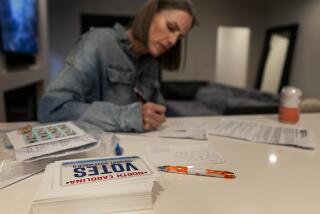A Way Out of the Corporatist Grip
- Share via
Presidential campaigns occur overwhelmingly on television, in mostly empty, deceptive 30-second advertisements that fuel public cynicism far more than they advance public enlightenment. Campaigns are now a “virtual reality” separated from real communities, real debates and real neighborhood organizing.
Predictably, this dreary daily repetition of the same slogans and buzzwords by increasingly look-alike major parties results in elections attracting a smaller percentage of voters to the polls here than any other Western country. More and more of these voters know they are choosing between the bad and the worse.
The central contention of electoral politics should be the proper distribution of power to maximize decisions on behalf of the general interest.
After a brief decade (1965-75) of consumer, environment and civil rights movements countervailing corporate power, the global companies consolidated their position and have since concentrated their influence over both political parties, our federal government, our economy and our very culture.
The reflection of this corporatist grip can be seen in what both Bill Clinton and Bob Dole, drawing on these commercial interests for cash and sustenance, do not discuss or disagree on in their campaigns or their platforms. Neither has addressed pervasive corporate crime, bloated corporate welfare, genuine campaign finance reform, energy independence, universal health insurance, weakened civil liberties, collective bargaining and job safety laws for workers, the size of the military budget, housing, the corporate merger wave, GATT and NAFTA, and the nonenforcement of consumer, environmental and natural resource laws. Unfortunately, the very media that have reported frequently on these topics over the years fall right into the narrow agenda rut that has been dug by these politicians and their consultants.
Any politician who has been on the hustings knows that a unifying force among citizens of different backgrounds is their sense of having lost the ability to shape their future.
Voters find their votes being nullified by campaign money and, given the absence of a binding none-of-the-above ballot option, they cannot even register a no-confidence or protest vote.
Workers can scarcely organize trade unions, so weak are the laws, so strong the anti-union strategies of employers.
Consumers’ access to the courts is being destroyed by the twin corporate-backed drives of tort reform and compulsory arbitration.
Taxpayers have virtually no legal standing in federal courts to challenge the corporate/government complex of waste, fraud and abuse of their monies. Nor do they have much influence regarding how their monies are allocated and used in the federal budget (which is why they are receptive to politicians promising tax rate deductions).
As for savers and investors, no more need be said than to mention the massive bailouts imposed on these people as taxpayers for the S&L; debacle and other financial crimes and speculation.
The challenge to citizens in the polling booth is to choose leaders who will strengthen the tools of democracy for these roles that individuals play in our political economy. These tools will deconcentrate power and greatly enhance an informed community intelligence with which to solve or reduce our national problems.
Throughout our history, each time concentrated power was challenged by a strengthened democracy of citizens, America became a better, more just society. Whether by the abolitionist movement, the women’s suffrage drive, the farmer populist reforms, the trade union initiatives and the more recent efforts on behalf of consumer, environmental, disabled people’s and women’s rights, to name a few, the expansion of the power of the many vis-a-vis the domination of the few raised our society to new levels of human possibilities.
When people go to the polls next Tuesday, their vote should be weighted well beyond helping a landslide candidate or choosing between Tweedledee-Tweedledum politics-as-usual offerings. Votes can be cast to build political futures to encourage more Americans to join progressive politics and to broaden the public agenda.
Presidential and other political campaigns should be of, by and for the people if the resultant governance is to adhere to those same accountabilities. This means working at democracy with our time and talents long before election day.
This much is certain: If millions of Americans continue to turn off politics, politics will continue to turn on them, to the detriment of their standards of living, justice and freedom.
More to Read
Get the L.A. Times Politics newsletter
Deeply reported insights into legislation, politics and policy from Sacramento, Washington and beyond. In your inbox twice per week.
You may occasionally receive promotional content from the Los Angeles Times.










